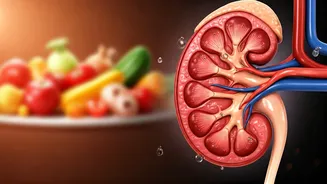Hydration is Essential
Staying adequately hydrated is paramount for maintaining healthy kidneys. The kidneys' primary function is to filter waste and excess fluids from the body;
this process relies heavily on sufficient water intake. Dehydration can impair kidney function, leading to potential complications like kidney stones and infections. To ensure proper hydration, aim to drink enough water throughout the day. The exact amount varies based on individual factors such as activity level, climate, and overall health. Monitoring the color of your urine can be a helpful guide; a pale yellow color typically indicates adequate hydration. Incorporating water-rich foods like fruits and vegetables into your diet can also contribute to your daily fluid intake. Consistently drinking enough water supports kidney function and promotes overall health, reducing the risk of kidney-related issues.
Mindful Dietary Choices
Diet plays a substantial role in kidney health. A balanced diet, rich in whole foods, is beneficial. Limit processed foods, excessive sodium, and added sugars, as these can strain the kidneys. Focusing on fresh fruits, vegetables, and lean proteins helps reduce the workload on the kidneys. Consuming too much protein, particularly animal protein, can potentially stress the kidneys. Portion control is also important, as overeating can lead to weight gain, which can increase the risk of kidney disease. It's also critical to limit the intake of phosphorus and potassium, especially for individuals with existing kidney issues, as these minerals can build up in the blood. Consulting a healthcare professional or a registered dietitian can offer personalized dietary guidance tailored to your specific health needs and kidney function, making your dietary choices more effective in supporting kidney health.
Regular Physical Activity
Engaging in regular physical activity is a cornerstone of overall health, including kidney health. Exercise helps maintain a healthy weight, which is crucial, because obesity and being overweight can increase the risk of kidney disease. Physical activity also helps regulate blood pressure and blood sugar levels, two significant factors impacting kidney health. High blood pressure can damage the blood vessels in the kidneys, hindering their ability to filter waste effectively, while uncontrolled blood sugar from diabetes can cause similar damage. Aim for at least 150 minutes of moderate-intensity exercise, such as brisk walking, swimming, or cycling, each week. Incorporate a mix of aerobic exercises and strength training to maximize the benefits. Starting slowly and gradually increasing the intensity and duration of your workouts is recommended. Regular exercise not only supports your kidney health but also enhances cardiovascular health, boosts your mood, and provides you with more energy.
Avoid Harmful Substances
Avoiding harmful substances is essential for protecting kidney health. Smoking, for example, damages blood vessels throughout the body, including those in the kidneys, leading to impaired function and potentially chronic kidney disease. Excessive alcohol consumption can also damage the kidneys, and it can affect blood pressure and overall health. Furthermore, the overuse of certain medications, such as nonsteroidal anti-inflammatory drugs (NSAIDs) like ibuprofen or naproxen, can harm the kidneys, especially when used regularly or in high doses. It's always a good idea to discuss the use of any medications with your doctor, particularly if you have kidney problems. The best approach is to limit alcohol consumption and quit smoking, as these steps will have a profound effect on your kidneys' well-being. By making these changes, you significantly lower the risks of kidney damage and other severe health issues.
Regular Medical Checkups
Regular medical checkups are a proactive way to maintain kidney health. These checkups usually involve tests to evaluate your kidney function, such as blood and urine tests that measure creatinine levels, estimated glomerular filtration rate (eGFR), and the presence of protein in your urine. Early detection of any kidney issues can lead to timely interventions and treatment, potentially preventing the progression of the disease. If you have a family history of kidney disease, diabetes, or high blood pressure, it's particularly important to undergo regular checkups. Discussing your kidney health with your doctor, including any symptoms or concerns, is crucial. If any abnormalities are detected, your doctor can recommend appropriate treatment, lifestyle changes, and follow-up tests to monitor your condition and ensure optimal kidney health. Early detection and proactive care are important in safeguarding your kidney health.





















